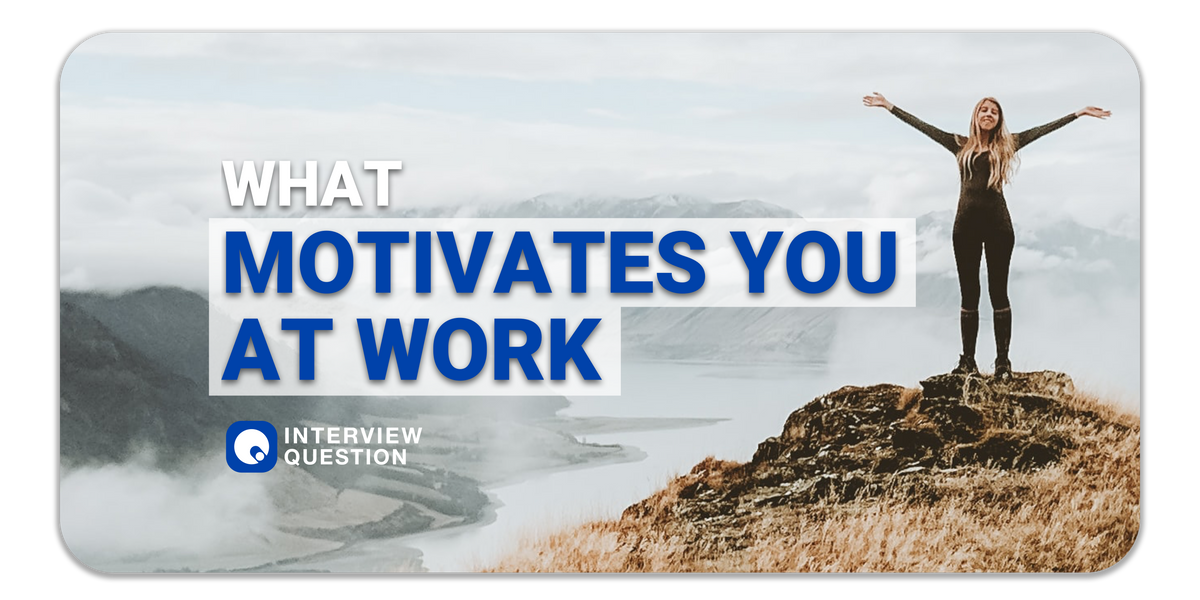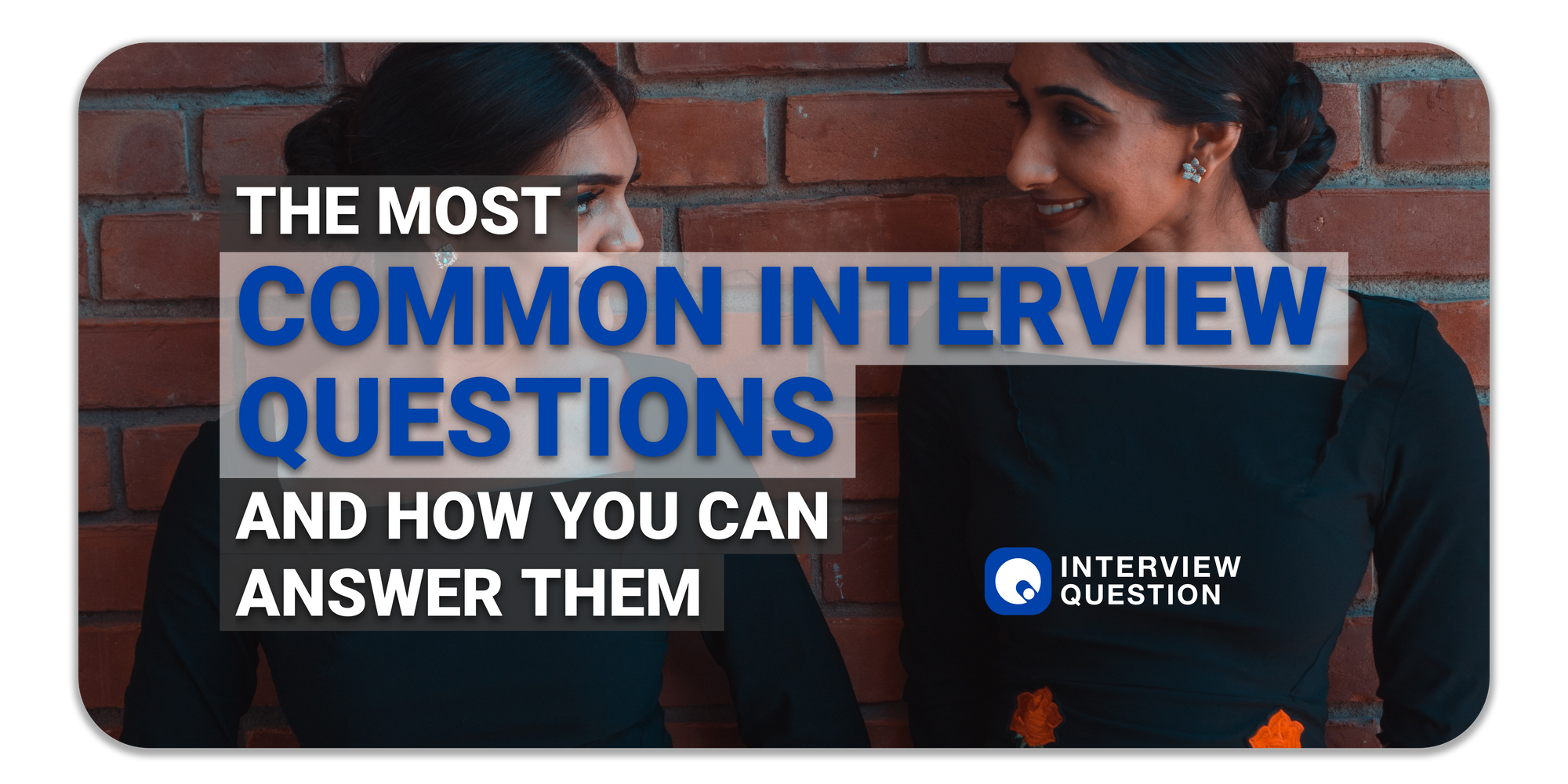What motivates you - at work & in life?
Possible motivators | Structuring a reply | Sharing workplace motivations | Elaborating your response | Trigger questions | Objective of the interviewer's question

Interviewers often want to know the driving forces behind a candidate's career. Many interviewers will ask, "What is your motivation for this position?" What motivates you?
Possible motivators
We can be motivated by a variety of factors: money, the ability to do your own thing and make decisions, the chance to learn new skills and experiences, or simply by being around positive people who share our ideals.
Figuring out what motivates us in life can help us make better choices about what type of profession we want to pursue and also inform how we carry ourselves as professionals. This dangling carrot can come in the form of an incentive, a reward or even a sign of recognition.
Structuring a reply to the interviewer
In coming up with an appropriate response to "what motivates you?", a candidate should start by restructuring the question.
Think about what gets you excited as a person - at work, at home, and also in various informal settings. Think about gives you joy, life, ups the motivation levels and elevates morale.
Do you enjoy meeting challenges, solving problems, and taking risks? Do you love talking about your philosophy of work? Are you intrigued by people's reactions to what you do - both positive and negative?
Your possible responses could include:
- I find that the professional challenges at work are very motivating.
- I like to take on something new and see if I can turn it into a success.
- I'm a risk taker, so this really motivates me.
- What motivates me is the ability to be part of something important and make a difference in people's lives.
- Trying to make sure we're moving in the right direction and staying focused is always challenging, but that's what keeps me going in my work.
In essence, a candidate should express the factors which would allow them to feel a significant sense of accomplishment. This does not have to be immediate gratification (a cup of coffee should not be the main motivator of your career!), and may come in steps or phases.
There are often signposts which act as indicators of success - like a project milestone, deliverable, key implementation step (maybe a testnet, trial, etc.) - which builds up to an eventual larger goal. Employers may choose to reward you in a way you value when you reach those signposts; experiential rewards could be monetary form like a gift card, or a symbolic one like a award for emerging victorious from tough times and bring a boost to morale and team spirit.
Understandably, your response may not be set in the right context.
You may just mention that your kids drive your life and you work so you can earn more money so that the young ones can lead a better life, plus with money it buys time and you wish for the day you could spend all your time with people in your life. Or maybe you love basketball, yoga or running. All these responses are all genuine and evoke the human element, but they simply cannot be reasonable responses in an interview setting.
Your potential boss won't be paying you to accompany your kinds or do your favourite leisure sport.

We can therefore reframe the question in this way: "What gets you excited about working with this specific company, this specific team, and these specific people?" In this way, you link your response with what you know about the open position. You'll consider the challenges, the opportunities, and the people who will be working with you. You set the context right again - we want to talk about workplace motivations.
Sharing workplace motivations
In today's workplace, we often blame the fact that there are so many excellent candidates for our lack of job security. A host of motivational factors - outside forces such as technology, mergers and acquisitions, or budget cuts - all play a role in our jobs' stability. But not all leaves us feeling burned out or underpaid.
How we're motivated in work will reflect on how we approach our personal lives and also with our colleagues, friends and family members.
Key points to bring up in a conversation about the factors which would convert you into a motivated employee should relate to your vision of your career path and how the job you have applied for gets you there.
You might say that you've been very interested in ____ industry or profession, and this job represents a unique opportunity at a company you believe in. Or maybe it's something more personal - perhaps if offers a chance for you to continue growing professionally in your chosen field? Be careful about how ambitious your response sounds.
Here are more examples. You may say that working in this company would allow you to work on xxx or a certain project. If, however, the interviewer was really interested in how motivated you were by the name of the business and not the particular tasks involved, they would be more concerned with whether you could perform effectively at xxx.
In either case, it's important to think about how your response reinforces your strengths and experience.
Elaborating your response on workplace motivations
After giving a preliminary response, your boss will want to probe more deeply. How did you get exposed to this industry? What kind of job did you want to do? What's it like working for the company?
Remember - your motivation is a personal choice. It should also evoke positive emotions, ideally one that will leave you with a good feeling about your career path and/or the company in question. Once again, this depends on what's relevant at the moment and what is on the interviewer's mind.
To get you started and keep the conversation on motivations on track consider this outline:
- define your vision, career development goals, 5-year plan
- acknowledge your accomplishments, come up with new goals, and reflect on the past
- set achievable goals that are within your reach, and set a visionary major goal
- set personal incentives for yourself, giving you a reason to become a motivated employee
- finally, check to see where this fits with what the interviewer has in mind for you, and adjust expectations accordingly
Answering "why" questions is difficult because these are usually the trickiest questions and require you to think about the speculate a future which your interviewer or the company you are seeking a job at may not agree with. Nevertheless, trying to answer them with a logical explanation on how you came to such a conclusion is wise. Your answer may not meet score a 100%, but a reasoned response shows your passion, confidence and enthusiasm which is what interviewers and potential employers are always looking for.
Trigger questions which help you soul search for intrinsic, personal motivators
Before we end this article, you will find a list of trigger questions for self-reflection. These questions are meant to question, incite deep thought and invite opportunities for introspection. They are extremely useful in helping you check whether you are really working towards your professional goals or if there is something else pulling you in the opposite direction.
Your workday motivations:
- What would it mean to me to fail at this?
- How could I be more effective as a leader?
- What do I really do for my customers?
- Why do I really want to work here?
- Who is my competitor and why can I out-do them?
- Would I fit in anywhere else better than here?
- How do you think motivated and inspired candidates will often describe their career path?
- Why do they think they can be successful in their chosen profession?
- How are they working toward reaching their goals and how will the company help them?
Ultimately it is key that you don't overthink it.
The objective of "What motivates you?" is a simple question which requires a simple and concise answer. The interviewer is not after a full dissertation on your motivations. Therefore, keep it brief and straightforward, emphasizing your interests and how they relate to the position you are interviewing for.
Give some response; a simple brief reply works well too. Then, wait. Your interviewer will help you along and adjust the topic in whichever direction it seems appropriate. Their comments will enable you to better understand the rationale behind these questions and the interviewer's underlying concerns.

Objective of the interviewer's question
Interviewers want to bring successful people into their company. Knowing what success means to the employee is a solid foundation of the employee-employer relationship.
Asking for an employees' intrinsic motivations helps set a common goal between parties early on, and eventually your responses can contribute on how the relationship can be developed.
Often your replies will be used to struture a career plan and compensation package which help a motivated employee like yourself get the best quality of work for their organisation, making it a win-win for both the employee and employer.
Also, designing amazing employee perks, organsiational strutures and arranging team building workgroups based off the motivations and consensus can help prevent mental stress, reduce friction and possibilities of making work time a tough time.
If you are a people person, managers can assign you to a team to be a collaborator and where you work with people. You may be a team leader, supervisor in future if need be. Whereas if you tend to be introverted, a "work from home" arrangement may be suitable where you become an individual contributor. Whichever motivates you more, and helps you output better work.
If you love the sense of ownership and sense of autonomy, you could take up projects or clients where you feel that you own and feel responsible for the inner workings and eventual outcome. Employers can relinquish certain aspects of control and reassign responsibilities if it works in favour for them to create a culture of happy teams with happy motivated people.
Interviewers are better able to assign you to "your happy place" when they understand your motivations, workplace goals and professional goals.
There are many, many possiblities and permutations but at the end of the day, the objective of the interviewer for finding out your motivations is so you become a great fit in the company. And in turn, you may just realise that their time to plan and thoughts put in show the care and importance they place in having really motivated people around at the office. (maybe!)


